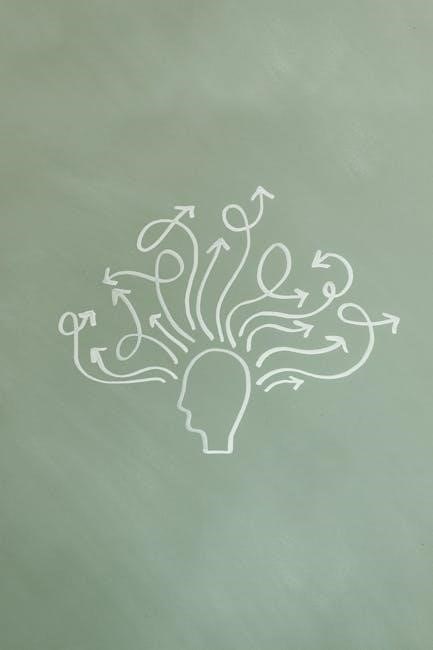
adhd interventions for therapists pdf
Discover effective ADHD interventions for therapists. Learn practical strategies to enhance your therapy sessions. Download the PDF guide now!
ADHD is a neurodevelopmental disorder requiring tailored interventions․ Therapists play a crucial role in managing symptoms through evidence-based strategies․ Combining pharmacological and non-pharmacological approaches often yields optimal outcomes‚ improving daily functioning and quality of life for individuals with ADHD․
1․1 Overview of ADHD and Its Impact on Individuals
ADHD is a neurodevelopmental disorder characterized by symptoms of inattention‚ hyperactivity‚ and impulsivity․ It affects both children and adults‚ often disrupting daily functioning‚ relationships‚ and academic or professional performance․ Research shows that 60% of young people with ADHD believe medication helps manage their symptoms․ Untreated ADHD can lead to challenges in interpersonal relationships‚ lower educational attainment‚ and reduced employment opportunities․ Adults with undiagnosed ADHD may experience greater psychosocial impairment‚ including lower salaries and higher rates of functional difficulties․ Early diagnosis and tailored interventions are crucial to mitigating these impacts and improving quality of life․
1․2 The Role of Therapists in ADHD Management
Therapists play a pivotal role in ADHD management by providing tailored interventions and support․ They educate individuals and families about ADHD‚ helping them understand the condition and its impact․ Therapists employ evidence-based techniques such as behavioral therapy and cognitive-behavioral therapy to address symptoms like inattention and impulsivity․ They also work to enhance daily functioning by teaching organizational and emotional regulation skills․ Collaborating with healthcare providers‚ therapists often combine non-pharmacological strategies with pharmacological treatments to optimize outcomes․ Their role extends to addressing co-occurring mental health issues‚ ensuring a comprehensive approach to improving quality of life for individuals with ADHD․
Evidence-Based Approaches for ADHD
Evidence-based approaches for ADHD include behavioral therapy and CBT‚ focusing on reducing symptoms and improving daily functioning․ These methods‚ often combined with other strategies‚ are tailored to individual needs‚ emphasizing effectiveness and sustainable improvement․
2․1 Behavioral Therapy for ADHD
Behavioral therapy is a widely used intervention for ADHD‚ focusing on modifying behaviors through positive reinforcement and clear expectations․ Therapists help individuals identify and replace negative patterns with adaptive ones․ Techniques include token economies‚ reward systems‚ and structured routines․ This approach often involves parents and educators to ensure consistency across environments․ By addressing specific behaviors‚ behavioral therapy aims to improve daily functioning‚ reduce impulsivity‚ and enhance organizational skills․ It is particularly effective in creating a supportive environment that fosters long-term behavioral change and emotional well-being for individuals with ADHD․
2․2 Cognitive-Behavioral Therapy (CBT) for ADHD
Cognitive-behavioral therapy (CBT) is an evidence-based approach for ADHD‚ focusing on identifying and modifying negative thought patterns and behaviors․ Therapists help individuals recognize cognitive distortions and restructure unhelpful beliefs․ Techniques such as thought stopping‚ problem-solving‚ and emotional regulation are commonly used․ CBT also emphasizes practical strategies to improve time management‚ organization‚ and impulse control․ By addressing both cognitive and behavioral aspects‚ CBT enables individuals with ADHD to better manage symptoms‚ reduce stress‚ and enhance overall functioning․ It is particularly effective for adults and adolescents in developing self-awareness and long-term coping strategies․

Pharmacological Interventions
Pharmacological interventions are a cornerstone of ADHD treatment‚ primarily involving stimulant and non-stimulant medications․ These help reduce hyperactivity‚ inattention‚ and impulsivity‚ improving focus and daily functioning effectively․
3․1 Stimulant Medications for ADHD
Stimulant medications are the most commonly prescribed and effective treatments for ADHD‚ helping to reduce symptoms like hyperactivity and inattention․ They work by increasing dopamine and norepinephrine levels in the brain‚ improving focus and impulse control․ Common stimulant medications include methylphenidate (e․g․‚ Ritalin) and amphetamines (e․g․‚ Adderall)․ These medications are available in immediate-release and extended-release forms‚ offering flexibility for individual needs․ Research shows that stimulants are effective for about 70-80% of patients․ However‚ they may have side effects like insomnia or appetite loss‚ and their use requires careful medical supervision to ensure safety and efficacy․ Regular monitoring is essential to adjust dosages and address any concerns․
3․2 Non-Stimulant Medications for ADHD
Non-stimulant medications are an effective alternative for individuals who cannot take stimulants due to side effects or certain medical conditions․ Atomoxetine (Strattera) is a popular non-stimulant ADHD medication that works by inhibiting the reuptake of norepinephrine‚ improving attention and reducing impulsivity․ Another option is guanfacine (Intuniv)‚ which targets receptors in the prefrontal cortex to enhance focus and emotional regulation․ Non-stimulant medications are often preferred for their lower risk of dependency and milder side effects․ They are particularly beneficial for patients with co-occurring conditions like anxiety or sleep disorders․ Regular monitoring is essential to assess their effectiveness and tolerability․

Emerging Digital and Technological Solutions
Digital tools like telehealth platforms and ADHD management apps are revolutionizing therapy access and symptom tracking‚ offering personalized support and enhancing engagement for individuals with ADHD․
4․1 Telehealth Platforms for ADHD Therapy
Telehealth platforms have emerged as a transformative tool for ADHD therapy‚ offering accessible and convenient care․ These platforms enable remote consultations‚ reducing barriers for individuals with mobility or scheduling challenges․ They also provide opportunities for real-time monitoring of symptoms and progress․ Telehealth allows therapists to deliver evidence-based interventions‚ such as CBT and behavioral therapy‚ virtually․ Additionally‚ these platforms often include resources for education and skill-building‚ empowering individuals to manage ADHD effectively․ With the rise of digital health solutions‚ telehealth is becoming a cornerstone in modern ADHD care‚ ensuring consistent and high-quality support for individuals worldwide․
4․2 ADHD Management Apps and Tools
ADHD management apps and tools provide innovative solutions to help individuals organize tasks‚ manage time‚ and track progress․ These tools often include features like task reminders‚ time management guides‚ and goal-setting frameworks․ Apps such as Focus@Will and Trello help users stay focused and organized‚ while tools like Habitica gamify productivity․ Many apps also offer AI-driven insights to identify patterns and provide personalized recommendations․ Therapists can recommend these tools to complement traditional therapies‚ enabling clients to develop better self-regulation skills․ These tools empower individuals with ADHD to take an active role in managing their symptoms and improving daily functioning․
Parent-Teacher Collaboration Strategies
Collaboration between parents and teachers is vital for managing ADHD․ Strategies include regular communication‚ shared goal-setting‚ and consistent behavioral interventions across home and school environments․
5․1 Building a Supportive Environment at Home
Creating a supportive home environment is essential for managing ADHD․ Establishing consistent routines‚ clear boundaries‚ and a clutter-free space helps reduce distractions․ Parents can implement organizational tools‚ such as visual schedules and checklists‚ to improve task completion․ Encouraging physical activity and mindfulness practices at home can enhance focus and emotional regulation․ Positive reinforcement‚ like praise or reward systems‚ fosters self-esteem and motivation․ Open communication and involvement in therapy goals ensure a cohesive approach‚ benefiting both the child and the family as a whole․
5․2 School-Based Interventions for ADHD
School-based interventions are critical for supporting students with ADHD․ Teachers can implement strategies such as individualized education plans (IEPs)‚ behavioral interventions‚ and preferential seating to minimize distractions․ Breaking tasks into smaller steps and providing frequent feedback helps improve focus and completion rates․ Positive reinforcement‚ such as praise or reward systems‚ encourages positive behavior․ Collaborating with parents and therapists ensures consistency in applying strategies․ Additionally‚ training teachers on ADHD management enhances their ability to create an inclusive and supportive learning environment‚ promoting academic and social success for students with ADHD․

Assessment and Monitoring Tools
Accurate ADHD assessments and monitoring tools are essential for tracking symptoms and treatment progress․ Traditional methods include behavioral checklists and rating scales‚ while digital tools offer real-time data collection․
6․1 Traditional Assessment Methods for ADHD
Traditional assessment methods for ADHD include standardized questionnaires‚ behavioral checklists‚ and clinical interviews․ Tools like the Vanderbilt Assessment Scale and Conners Rating Scales are widely used to evaluate symptoms․ These methods rely on observer-reported data from parents‚ teachers‚ and patients themselves․ Clinical interviews provide qualitative insights into behavior patterns and functional impairments․ Combining these approaches ensures a comprehensive understanding of ADHD symptoms and their impact on daily life․ Accurate diagnosis and monitoring are critical for developing effective intervention plans tailored to individual needs․
6․2 Digital Assessment Tools for ADHD
Digital assessment tools for ADHD offer innovative and efficient ways to evaluate symptoms and monitor progress․ Telehealth platforms enable remote evaluations‚ while mobile apps and online questionnaires provide accessible symptom tracking․ Computerized tests‚ such as continuous performance tests‚ measure attention and impulsivity objectively․ These tools enhance data accuracy and streamline the assessment process․ They also allow for real-time monitoring‚ making it easier to adjust treatment plans․ By integrating technology‚ therapists can deliver more personalized and effective interventions‚ improving overall patient outcomes and making ADHD management more accessible and efficient for both clinicians and individuals․

Coping Strategies and Techniques
Coping strategies for ADHD include behavioral coaching‚ self-help groups‚ and vocational support‚ helping individuals manage symptoms and improve daily functioning through tailored techniques and interventions․
7․1 Organizational Skills Training for ADHD
Organizational skills training helps individuals with ADHD manage tasks and time effectively․ Techniques include using planners‚ checklists‚ and digital tools to enhance structure and accountability․ Therapists teach strategies to prioritize tasks‚ reduce clutter‚ and create routines‚ fostering better focus and productivity․ These interventions aim to improve daily functioning by addressing challenges in initiating and completing tasks․ By mastering organizational skills‚ individuals with ADHD can achieve greater independence‚ reduce stress‚ and build confidence in handling responsibilities․ Tailored approaches ensure interventions align with personal needs‚ promoting long-term behavioral changes and improved overall well-being․
7․2 Emotional Regulation Techniques for ADHD
Emotional regulation techniques help individuals with ADHD manage impulsivity and emotional reactivity․ Strategies include mindfulness‚ cognitive restructuring‚ and emotional labeling․ Mindfulness practices‚ such as deep breathing and meditation‚ reduce stress and improve self-awareness․ Cognitive restructuring helps individuals identify and challenge negative thought patterns‚ fostering more balanced emotional responses․ Therapists guide clients in implementing these techniques‚ empowering them to handle emotional challenges effectively․ Regular practice of these skills enhances emotional stability‚ reducing impulsivity and improving interpersonal relationships․ These interventions are tailored to individual needs‚ promoting long-term emotional well-being and resilience in daily life․
Case Studies and Real-World Applications
Case studies highlight successful ADHD interventions‚ demonstrating practical strategies in real-world settings․ They provide therapists with insights into effective approaches and lessons learned from actual therapy sessions․
8․1 Successful Intervention Outcomes in Therapy
Successful ADHD interventions in therapy often result in improved focus‚ reduced impulsivity‚ and better emotional regulation․ Strategies like behavioral therapy and CBT have shown significant positive outcomes‚ enhancing daily functioning and relationships․ Many individuals experience increased organizational skills and academic or work performance․ Therapy sessions tailored to specific needs‚ such as time management and stress reduction‚ contribute to long-term success․ These outcomes highlight the effectiveness of evidence-based interventions‚ supported by research and real-world applications‚ making therapy a cornerstone of ADHD management․
8․2 Lessons Learned from ADHD Therapy Sessions
ADHD therapy sessions reveal valuable insights into effective intervention strategies․ A key takeaway is the importance of adaptability‚ as individuals with ADHD respond differently to various approaches․ Collaborative goal-setting and consistent reinforcement of positive behaviors are crucial․ Therapy also highlights the need for patient-centered approaches‚ addressing unique challenges and strengths․ Additionally‚ integrating pharmacological and non-pharmacological methods often leads to better outcomes․ These lessons underscore the importance of ongoing therapist training and the need for strong support systems to enhance long-term success in managing ADHD symptoms and improving quality of life․